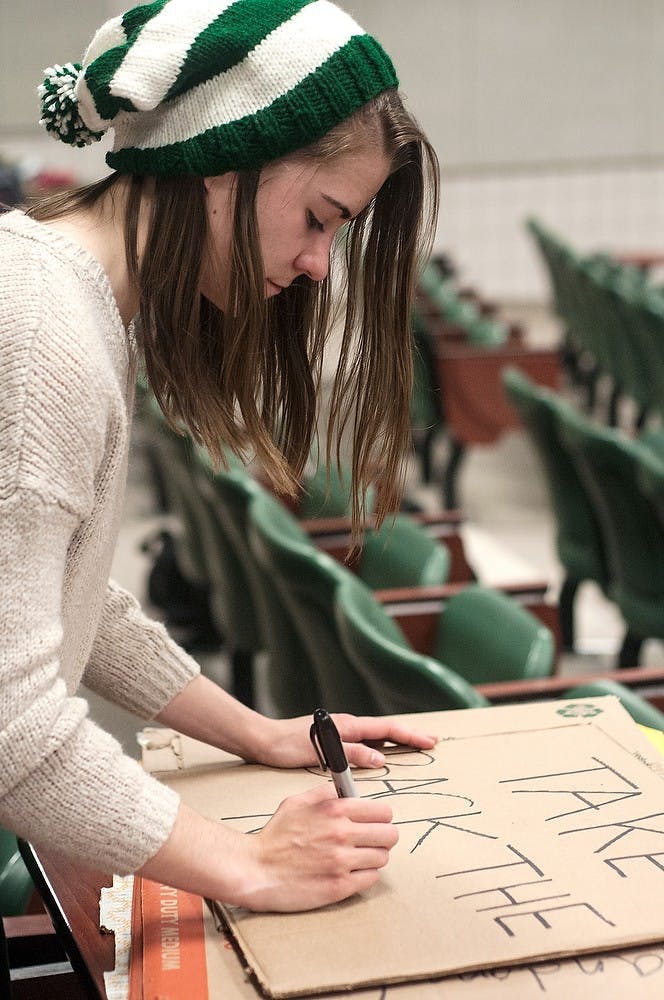At Take Back the Night, symbolic acts play a large role in the events.
The Clothesline Project, in which survivors of domestic and sexual assault hang up shirts emblazoned with their experiences, is close to the spirit of the movement. It’s also intended to help passers-by be more aware of the issue.
This year, though, the steel poles stood bare.
Last year when sexual assault on university campuses was emerging at the forefront of the national dialogue, the Take Back the Night events had been powerful, moving experiences. There was momentum and participation.
But when I walked into the Union Tuesday evening for a consent workshop, the first in a series of events for Take Back the Night, I walked into an empty room. It wasn’t the wrong time or place. No one had shown up. This emptiness became a trend over the next two days.
Later in the evening “Hunting Ground,” a film about sexual assault, was screened. With Director Kirby Dick in attendance, the room overflowed with students, faculty and staff attending the film. Despite the broad interest in the movie, next door was a room reserved for making posters littered with poster board and supplies, but was otherwise mostly vacant.
I wasn’t quite discouraged, though. A year earlier, Take Back the Night began with a slow start followed by a large participating audience at the “speak out” event.
When I arrived, it seemed the movement still had some energy. People had turned out and for the first time during Take Back the Night the speak out showed promise, until the conversation opened to the audience and silence spread.
One minute turned to 20 and a class with a professor stood up, leaving less than five students there.
The lone speaker was Take Back the Night chairwoman and public relations and policy senior Emily Kollaritsch, who was previously interviewed about her assault in The State News. She broke the silence by sharing a poem from her own experience.
Following the speak out, at about 6 p.m., a group of about 15 marched around campus and Grand River Avenue, holding signs and yelling chants, eventually stopping at Student Services and Administration Building to shout a list of demands.
Senior Admissions Counselor Florensio Hernandez was initially confused when walking out of Administration Building as the march participants turned away from the building — he didn’t know if it was a march or a protest, he said.
“It’s after work, most of the administration leaves at 5 (p.m.),” he said. “Protests are to educate. It’s having a strategy and being effective. Protests are as effective as the audience. They should have come at lunchtime. You have to be strategic to have results.”
Kollaritsch said this year’s lackluster participation could have stemmed from survivors choosing to distance themselves from people who don’t take it seriously.
“People laugh off rape by laughing at posters and protests,” Kollaritsch said. “People didn’t want to be a part of sexual assault awareness. I wish more people cared about the cause and understood the gravity of it.”
It’s worth saying that the weather wasn’t great. And this year’s march didn’t have the draw of a speaker like MSU alumna and sexual assault survivor Gretchen Whitmer — who spoke last year — for clout, but it still seemed like the fervor that had once been felt for the issue was fading from MSU.
International relations freshman Casey Paskus, the only person who made posters for the event, said it’s an issue that even family members don’t always grasp.
“My dad was surprised when I told him I didn’t feel safe walking on campus,” she said. “I’m always checking over my shoulder.”
But for this year’s Take Back the Night, no one marched to the Capitol. They took a bus.
The candlelight vigil, honoring and recognizing survivors of sexual and domestic assault, was canceled altogether.







